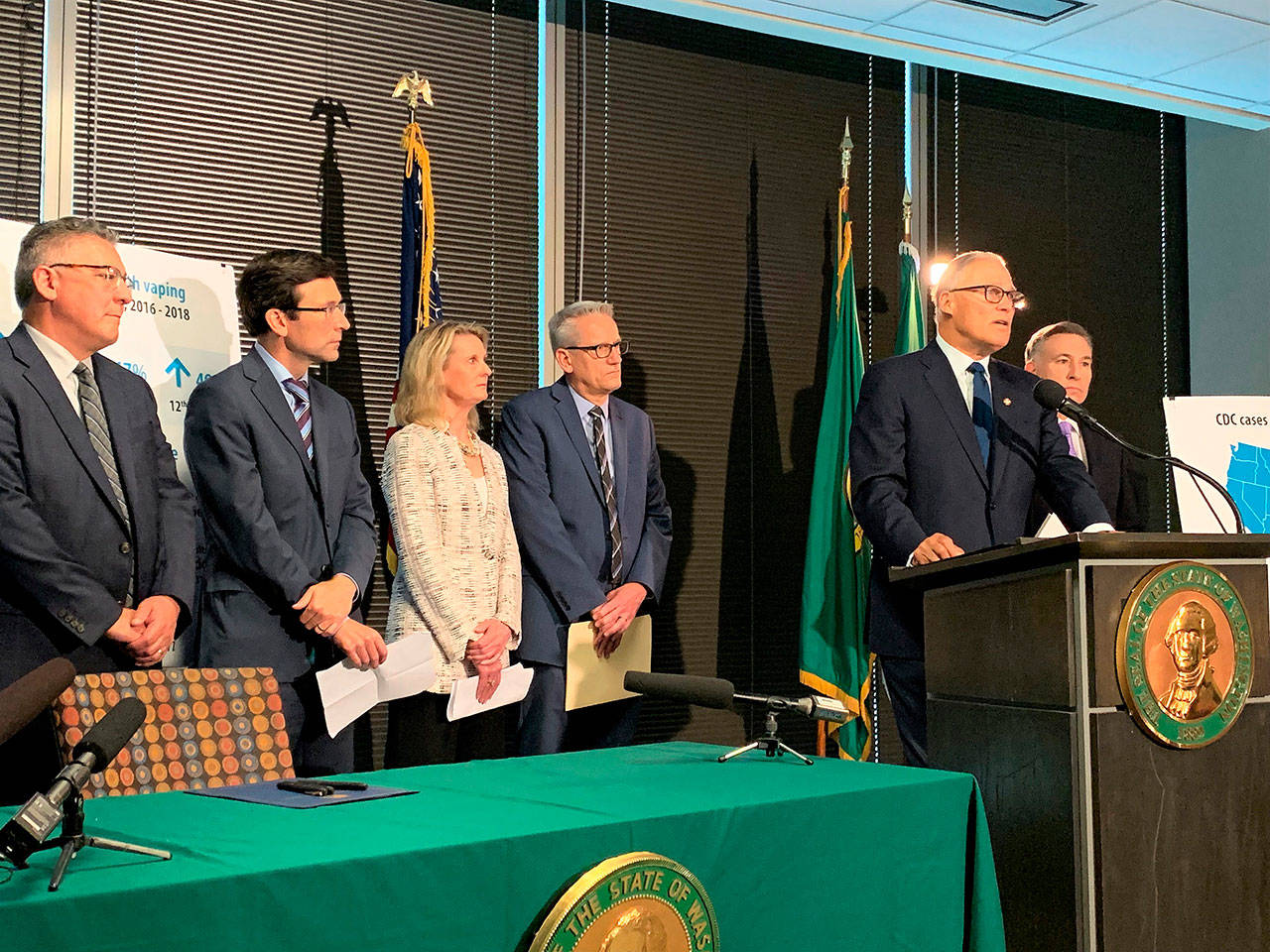Gov. Jay Inslee announced an executive order at a Seattle press conference Friday that changes how agencies will regulate, monitor and communicate about a variety of vaping products.
Other state leaders, including Attorney General Bob Ferguson and Washington State Department of Health Secretary John Wiesman, spoke at the event.
“We aren’t waiting for Big Tobacco to tell us what is in their products,” Inslee said in a press release. “We aren’t going to take health guidance from them, because we know that their goals are to make money and create new customers. That is what they are interested in. We are interested in ensuring that adults and young people have known and regulated ingredients in vaping products. Everyone deserves to know what is in the vaping liquid they are inhaling into their lungs.”
The announcement comes after medical professionals reported seven cases of severe lung illness in Washington from vaping devices or e-cigarette products. The Center for Disease Control has reported at least 12 deaths nationwide, as well as more than 800 cases of lung injury possibly related to these products.
The governor’s executive order directs the Washington State Department of Health to:
• Ask the state Board of Health to adopt emergency rules to ban all flavored vapor products, including flavored THC products.
The order also directs DOH and the Washington State Liquor and Cannabis Board to:
• Immediately ban any ingredients or sources that are found to be a cause of this acute lung illness; and
• Work together to draft governor-request legislation for 2020 that will ban all flavored vapor products; require disclosure of ingredients in vapor products; increase regulatory oversight; limit bulk sales; expand the educational campaign; and clarify the Department of Health’s authority in situations like this where there is a harm or risk to the public but the specific cause of that harm is unknown.
• Immediately take whatever steps they can to warn consumers of the risks, encourage health care providers to report all suspected cases, and expand their educational campaign to increase awareness around the dangers of vaping.
As of Friday, experts have not identified a specific product or substance that is causing the illnesses. Over the past few weeks, DOH has sent alerts to Washington health care providers and asked them to report any patients who could have severe lung disease associated with vaping.
“We now have seven cases of vaping lung disease in Washington,” Wiesman said. “It’s no surprise that the recent cases of vaping lung disease are in young people — these devices target our younger generations. We need immediate action to better regulate these products and end nicotine addiction. These lung injuries are extremely concerning, and we all need to act. I appreciate Gov. Inslee’s leadership on this issue. I also appreciate all our health care providers and public health staff who are working so hard to track down the problem and provide care to patients.”
Liquor and Cannabis Board Director Rick Garza, who spoke at the event, said his agency has been working closely with Office of the Governor, DOH and the cannabis vapor industry over the past few weeks.
“We will immediately issue consumer warning signs to state-licensed cannabis retail stores as well as require that licensed cannabis processors disclose all compounds — including ingredients, solvents, additives — used in the production and processing of vapor products and vaping devices themselves,” Garza said.
DOH is currently analyzing real-time data from hospitals to identify individuals that get admitted with severe lung disease. If the patient fits the health criteria that Centers for Disease Control and Prevention outlined, DOH will then talk with the health care provider, review the patient’s medical records and interview the patient to gather more information about their symptoms and vaping use.
Some patients have reported that their symptoms developed over a few days while others reported their symptoms developed over a few weeks. If you are a vape user who experiences shortness of breath, cough, nausea, vomiting and/or a fever, DOH recommends that you contact your medical professional immediately.
Sen. Karen Keiser, D-Des Moines, said the vaping market needs much more oversight if consumers are going to be safe.
“Scientists are not yet able to determine what exact chemicals from the extraction process or other ingredients may be causing the health problems we’re seeing,” Keiser said. “I am working with colleagues and stakeholders to draft a bill requiring that vape pen producers disclose all ingredients and the extraction methods they use so that consumers will be informed and researchers can get to the bottom of this puzzle. We must do everything possible to keep Washingtonians safe and healthy. As chair of the Senate Labor and Commerce Committee, I will schedule hearings to investigate all options. Oversight of the enforcement of regulations for both tobacco products and marijuana products is the responsibility of that committee.”
DOH recommends that vape users use products from regulated sources, and especially avoid products bought off the street. The department also recommends that users not alter their vaping devices or add any substances to the device. Vaping devices — also known as JUULs, e-cigarettes, e-cigs, vapes, vape pens, mods, tanks, e-hookahs, or electronic nicotine delivery systems — can contain marijuana, nicotine and other substances such as chemicals and flavoring agents.
Talk to us
Please share your story tips by emailing editor@kentreporter.com.
To share your opinion for publication, submit a letter through our website https://www.kentreporter.com/submit-letter/. Include your name, address and daytime phone number. (We’ll only publish your name and hometown.) Please keep letters to 300 words or less.

